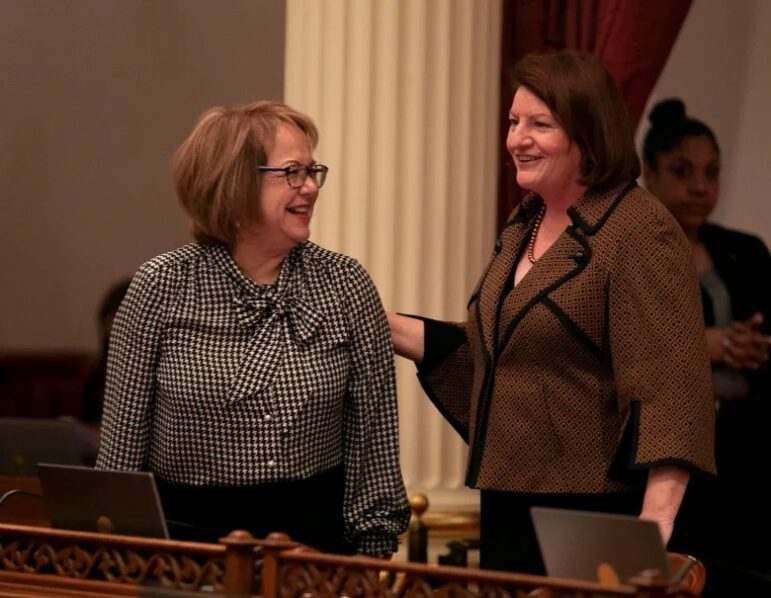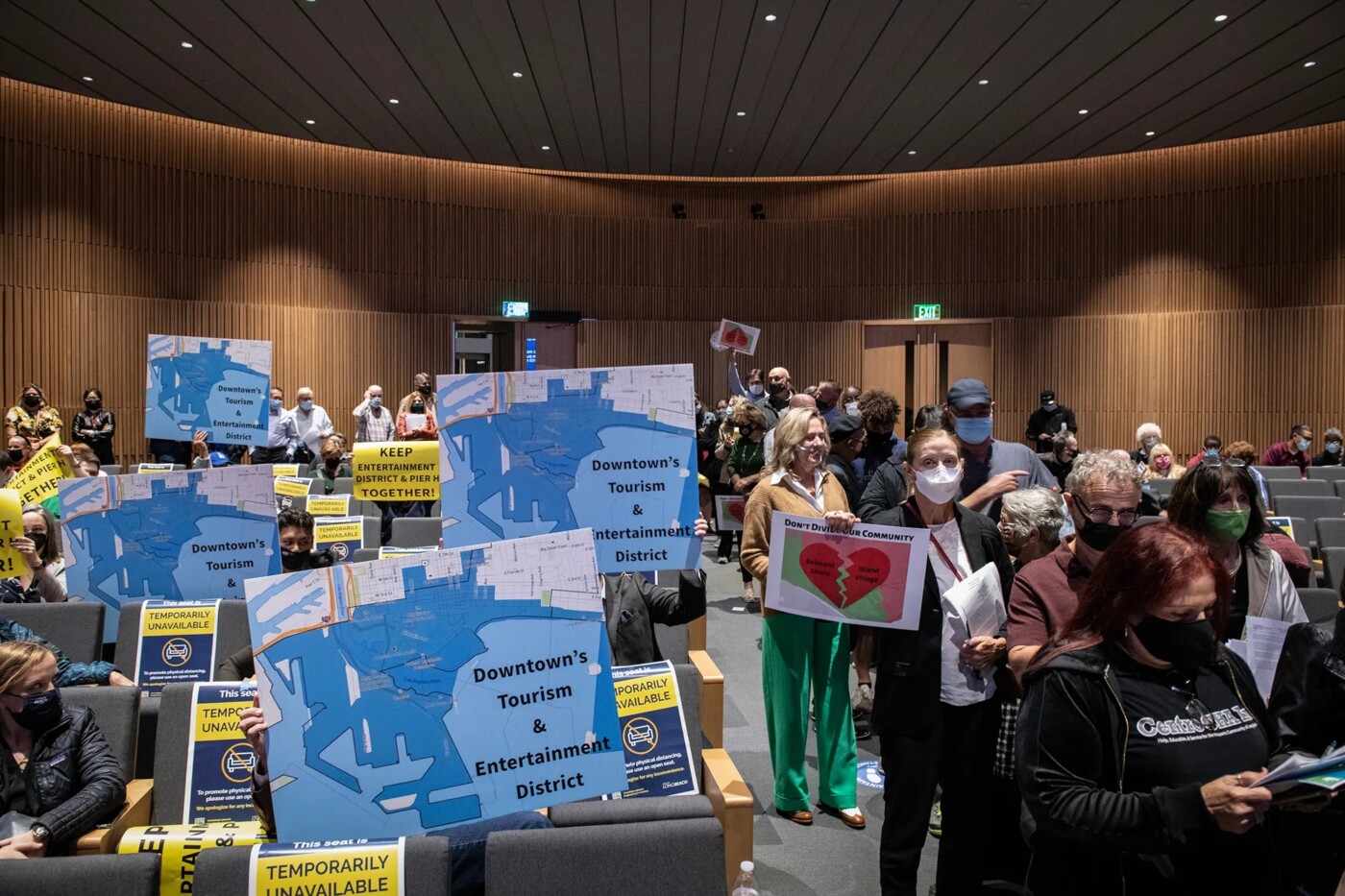In damning audio leaked last fall, three Los Angeles City Councilmembers made a bevy of racist comments about Black, Jewish, Armenian and Oaxacan people. Then the conversation turned to how they could get the city’s redistricting commission, which they appointed, to draw council maps that would allow them to stay in office.
“If we can slice and dice this baby up to cut you off where you think that favorable people are in … I’m all for that,” Nury Martinez, who resigned after the leak, said at one point. “I just need to know what I’m working with, with this map.”
The council adopted a map that disregarded suggestions from the advisory commission and that kept resource-rich Exposition Park out of the one Black-majority district.
Across California, new districts were drawn after the 2020 Census, as they are every 10 years, to make sure that every congressional, legislative and local district has about the same number of people. But who is grouped together in a district can empower or disenfranchise a community. And until 2010, on both the state and local levels, the mapping was done by elected officials themselves, often behind closed doors.
Backed by good government groups, voters created an independent state commission and new requirements for local jurisdictions. But fresh off redistricting in which not just officials in Los Angeles, but in cities and counties around the state, failed to solicit community feedback or incorporate it into the actual maps, those groups and lawmakers are trying again to expand local independent redistricting.
On Tuesday, Assemblymember Isaac Bryan, a Democrat from Culver City, introduced a bill to require jurisdictions with populations of 300,000 or more to form fully independent redistricting commissions. That’s in addition to a bushel of bills calling for independent redistricting in specific jurisdictions, including Los Angeles and Orange and Sacramento counties.
“We’ve seen the fallout from the crisis around the redistricting process in the city of Los Angeles, and the concerns that have emerged across the state,” Bryan said.
“The people of California have the right to a fair, independent redistricting process that recognizes community concerns and uplifts community voices.”
Some cities and counties have already set up such commissions, including Long Beach, San Francisco and Los Angeles County. In 2019, a bill to require independent commissions for all counties with more than 400,000 residents passed the Legislature, but was vetoed by Gov. Gavin Newsom, who said that while the commissions were “an important tool in preventing gerrymandering,” local jurisdictions were already authorized to create them. He added that the measure would require counties to be reimbursed, and therefore should go through the budget process instead.

Sen. Ben Allen, a Democrat from Redondo Beach who authored the 2019 bill and has worked closely with Bryan on the new one, said the proposed legislation works in flexibility for local governments, unlike past efforts.
“It’s part of why I prefer this approach, which is ultimately about trying to give (local jurisdictions) more discretion,” Allen told CalMatters. “I think there’s real merit to providing parameters for how this ought to be done and then allowing local communities to do what’s best for them.”
Incorporating local flexibility may help ward off challenges that have come to past efforts. California’s Constitution allows charter cities including Los Angeles to control their own affairs.
The bill follows a report commissioned by California Common Cause, the Southern and Northern California chapters of the ACLU, the League of Women Voters of California and Asian Americans Advancing Justice-Asian Law Caucus. The report studied redistricting in about 100 cities and counties and found “widespread gerrymandering” — but not as much in places with independent commissions.
“We found across the board, no matter how a jurisdiction had set up their independent redistricting commission, it resulted in a more participatory process — respecting communities and neighborhoods,” said Laurel Brodzinsky, legislative director with California Common Cause.
The report identified some of the biggest issues across the state: Advisory commissions in which members acted as proxies for elected officials who appointed them; boards that held only the bare minimum of public meetings; and others that did not incorporate any community feedback into the maps.
Bryan’s bill would require counties, cities, school districts and community college districts to set up their own independent commissions by March 1, 2030 — in time to draw maps after the next Census. The structure would be modeled after some parts of the statewide commission: members selected from qualified applicants who then select the rest, and minimum requirements for public input and outreach. But unlike the state commission, there wouldn’t be requirements on party representation or citizenship for commission membership.
If a city, county, school or community college district is unable to set up an independent commission in time, the bill lists back-up options, including a panel of retired judges or an ethics commission, to select the commission.
“The redistricting process is such an important part of our democracy. It really does play such an important role in determining who gets elected,” Allen said. “We feel good that we’ll get it to a place where the governor feels comfortable.”
The statewide and local bills this session follow three laws passed last year that created independent commissions in Riverside, Kern and Fresno counties.
SB 52, introduced by Democratic Sen. María Elena Durazo of Los Angeles, seeks to create an independent commission for the city of Los Angeles. It’s not the first time independent redistricting has been debated in Los Angeles — but the promise is never kept, Durazo said. The audio leak motivated her to introduce it as her first bill this session, but she also noted that redistricting impacts how state money is distributed.
“That’s what elevates it from being a local city concern to a statewide concern — when billions and billions of dollars are distributed to the city of Los Angeles with the hopes that it’s going to be fairly used in the city,” she said. “And then you get districts that are made not on the basis of what’s a community of interest. They’re made on the basis of ‘Can I get reelected?’”

Durazo said she’s willing to work with other legislators on a statewide effort. “I just want to make sure that we fix the problem,” she said.
The bill for Sacramento County, introduced by new Democratic state Sen. Angelique Ashby, would apply to the Board of Supervisors, which oversees tax collection, land management and distributes state and federal funds.
“The county did hold hearings, but elected officials drew the lines themselves, which just really isn’t a best practices model and left certain communities feeling unheard,” said Ashby, a former member of the Sacramento City Council, which has an independent commission that helped diversify geographic representation by creating a second seat in the fast-growing Natomas area.
Ashby’s bill includes some parameters such as barring commissioners who have run for office in the previouis decade, or who have other conflicts of interest. Like Durazo, Ashby said she’d be willing to fold her bill into a larger statewide effort, but wanted to introduce SB 314 to get the conversation started.
“I’ve been at the local level and have lived through both not having a commission and having a commission, so I think I’m a pretty decent spokesperson for that effort,” she said, “Sacramento can just be a good leader in this discussion across the state of California.”
There’s also AB 34, introduced by Democratic Assemblymember Avelino Valencia of Anaheim, which would require an independent commission to draw districts for the Orange County Board of Supervisors.
Valencia said his bill’s intent is to help avoid partisan conflicts or favoritism in district maps.
“I don’t believe politicians should be in charge of drawing their own districts,” Valencia said. “Having a degree of separation between the redistricting process and elected officials is a good thing for democracy.”
If the statewide bill passes, it would grandfather in existing local redistricting commissions so that they don’t have to start over.
Allen, a principal co-author, said other legislators could move ahead with their bills if there are specific issues in a county.
Brodiznsky, of California Common Cause, said the multiple bills show that the Legislature understands the value of independent redistricting. “It’s really showing this movement that a more comprehensive approach is needed versus this piecemeal approach.”
If the statewide bill fails, Bryan has another that would at least address some gaps in the current system.
Bryan, chairperson of the Assembly’s elections committee, has introduced AB 764, which would reform the 2019 FAIR Maps Act that outlines some redistricting requirements for cities and counties, regardless of who draws the maps.
Advocates have said that the FAIR Maps Act is unclear on whether incumbency is allowed to be considered after all other criteria are met, or not at all.
The law did give citizens one tool for accountability: After the 2020 map-drawing, residents of Riverside and San Luis Obispo counties sued over alleged violations, such as lack of transparency and not providing Spanish translation services.
Language for AB 764 is still in the works, but it would prohibit considering incumbency, clarify the priority order for mapping criteria and standardize public engagement requirements.
The two bills, Brodzinsky said, “are really two parts to the same puzzle of improving redistricting.”
For the record: An earlier version of this story misstated the year for the previous statewide bill for local independent redistricting commissions. It also misstated the role of retired judges or ethics commissioners prescribed in the new bill.
